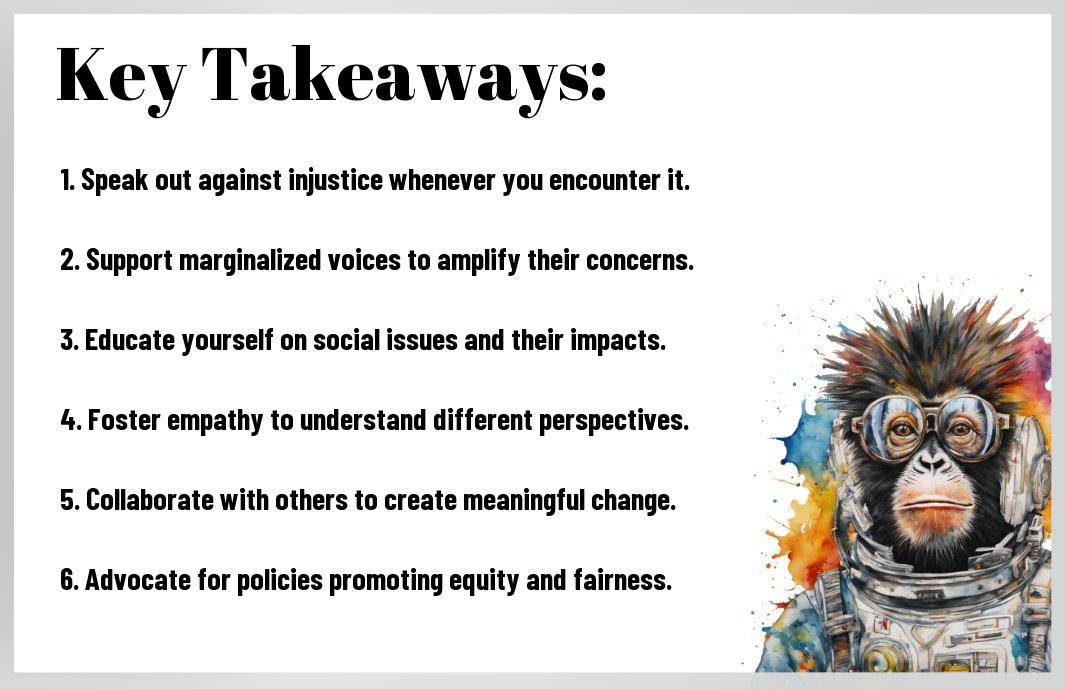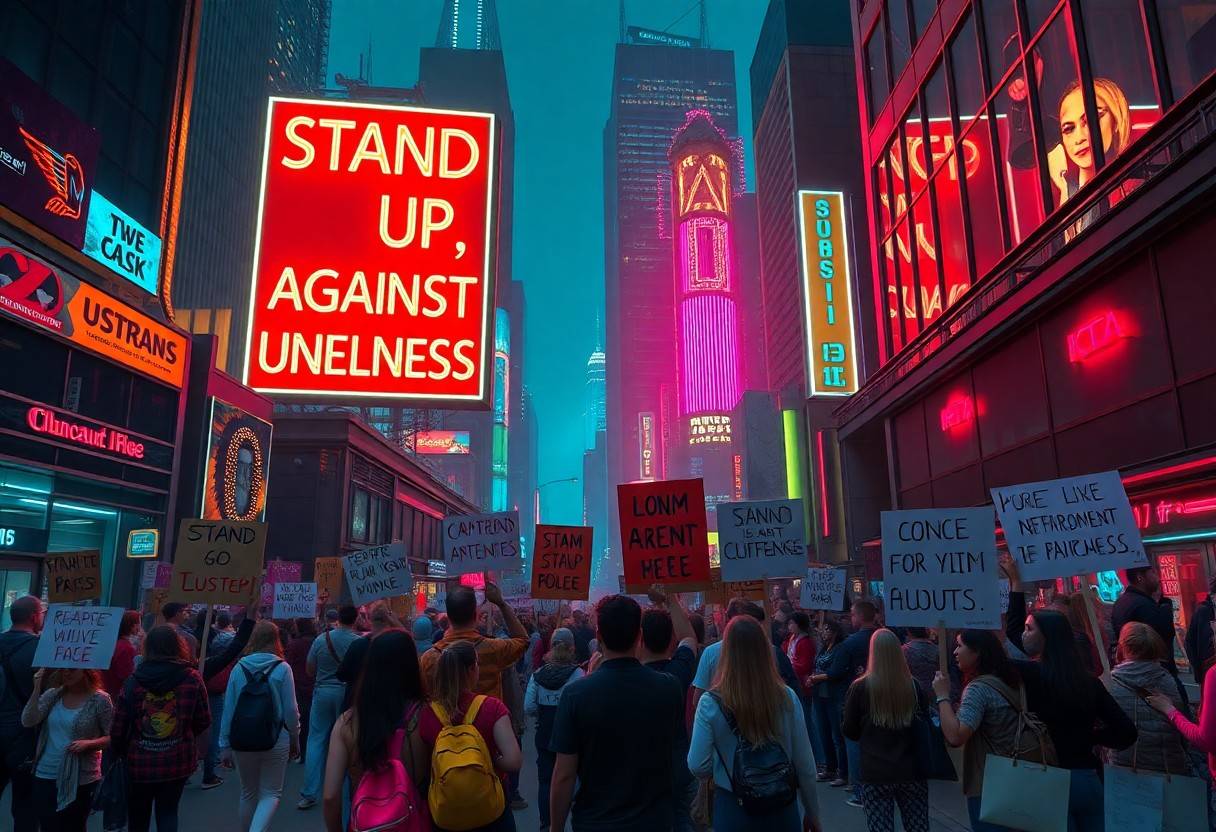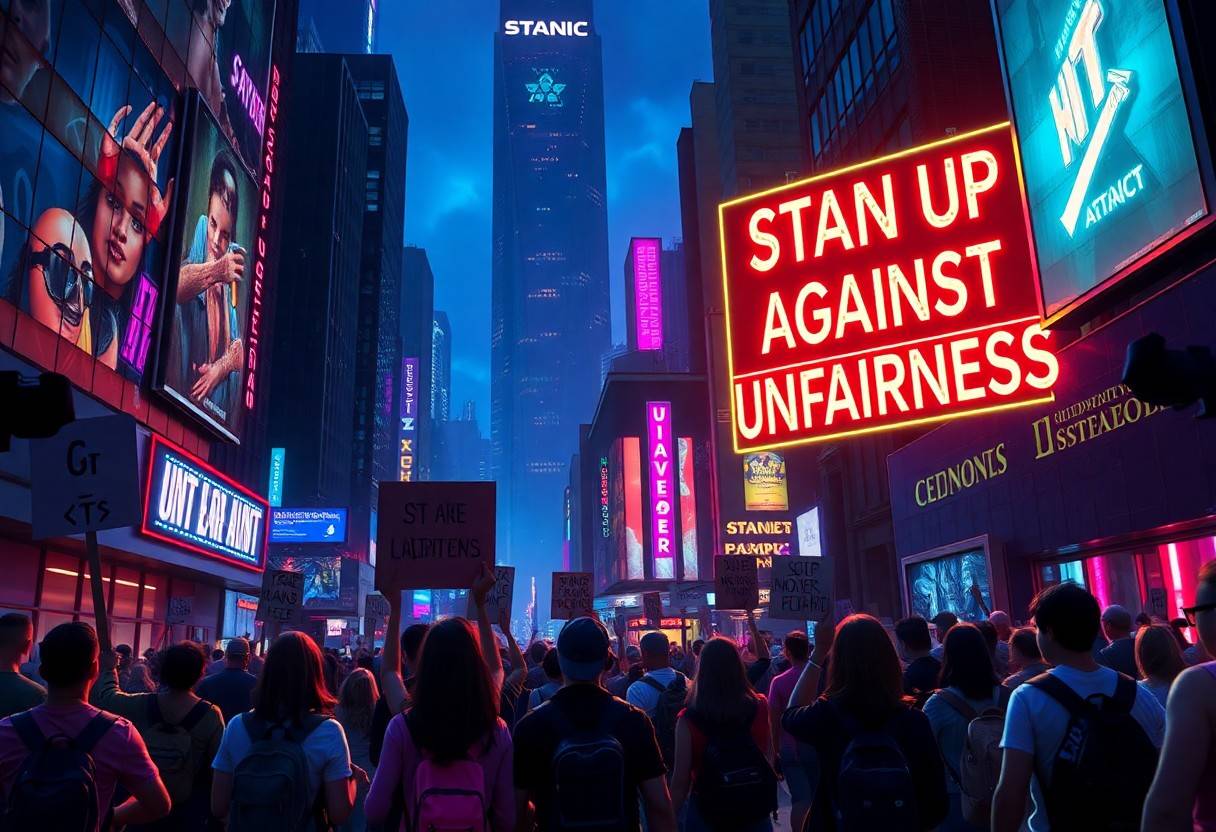
Newsletter Subscribe
Enter your email address below and subscribe to our newsletter

Enter your email address below and subscribe to our newsletter

Activism is crucial for creating a just society where unfairness is challenged and equal rights are upheld. I believe that every individual has the power to combat injustice within their communities. By standing up against discrimination and advocating for positive change, you can help pave the way for a more equitable world. In this post, I’ll explore the importance of active engagement in promoting justice and provide practical steps you can take to make a difference in your own life and the lives of others.

For many, unfairness manifests in various societal aspects, leading to feelings of distress and helplessness. To stand up against these injustices, we must first recognize their presence in our daily lives. Understanding unfairness involves acknowledging how it can systematically disadvantage certain groups while privileging others, fostering an environment where inequity thrives. By shedding light on these issues, we equip ourselves to advocate for justice and equality.
The concept of unfairness in society refers to the unequal treatment or distribution of resources and privileges among individuals or groups. It can arise from biases based on race, gender, economic status, or age, leading to significant disparities in opportunities and outcomes. Recognizing these disparities allows us to challenge behavioral norms that perpetuate inequality.
Against the backdrop of societal structures, unfairness can manifest in various forms, impacting individuals cornered by discrimination and injustice. Some common types include:
| Type | Description |
| Economic Inequality | Disparities in wealth and income |
| Racial Discrimination | Unequal treatment based on race |
| Gender Bias | Inequities based on gender |
| Ageism | Discrimination based on age |
| Health Disparities | Unequal access to healthcare |
This understanding helps us identify areas in need of reform and action.
To further expand on the types of unfairness, I realize that the implications extend beyond personal experiences, affecting social cohesion and wellbeing. Each type of unfairness contributes to a culture of inequality, impacting people differently. Various factors include:
| Type | Effect |
| Economic Inequality | Limits access to necessary resources |
| Racial Discrimination | Inhibits social mobility |
| Gender Bias | Restricts career growth |
| Ageism | Marginalizes older populations |
| Health Disparities | Increases mortality rates |
This overview informs us where collective action is most needed and serves as a foundation for fostering justice.
You may not realize it, but justice is the backbone of any fair society. It ensures that all individuals are treated equitably and that their rights are respected. Justice acts as a guiding principle in our interactions, fostering trust and cooperation. Without it, chaos reigns, and the foundations of a healthy community begin to crumble. Understanding the importance of justice not only empowers you, but it also inspires everyone around you to advocate for a more just world.
Below the surface of every fair society lies a firm commitment to justice. This commitment enables individuals to resolve disputes without resorting to violence and maintains social order. Justice promotes equality, ensuring that everyone has access to the protection of laws and that rights are upheld. In a society that values justice, collaboration flourishes, and shared values are protected, fostering a sense of community and belonging for all.
Importance can be drawn from examining the evolution of justice throughout history. Societies have long grappled with concepts of fairness, often shaped by cultural principles and legal frameworks. The understanding of justice has shifted dramatically, reflecting the changing landscapes of morality and ethics. By studying these perspectives, we can derive valuable lessons from past injustices and strive for a more equitable future.
In addition to providing context, historical perspectives on justice reveal significant examples of both progress and failures. For instance, the Abolition of Slavery stands as a testament to humanity’s ability to correct a profound injustice. Conversely, injustices during periods such as the Holocaust highlight the potential for society to falter in its moral obligations. By analyzing these events, we learn the importance of vigilance and advocacy, ensuring that we do not repeat the mistakes of the past as we work towards a more equitable future.
Many individuals encounter unfair practices in various aspects of life, from the workplace to everyday transactions. Understanding what constitutes unfairness is important for effectively combatting it. By recognizing these injustices, I can empower both myself and others to take a stand and promote a more equitable environment. The first step in fostering justice is identifying the nuances of unfair practices that may often go unnoticed in our daily interactions.
Practices such as discrimination, exploitation, and inequality manifest in countless ways, undermining the foundation of fairness. I see these forms of unfairness in various sectors, including hiring processes, pay disparities, and unwarranted favoritism. It’s vital to be vigilant in spotting these issues in order to create a culture where every individual is treated justly and given equal opportunities.
With keen observation and analysis, you can uncover deeper systemic issues that perpetuate unfairness within society. These may include institutional policies that favor certain groups or societal norms that stigmatize others. To combat systemic unfairness, I must look beyond individual actions and scrutinize the larger framework within which these practices exist, fostering a comprehensive understanding of the root causes.
And as I examine deeper into identifying systemic issues, I realize it’s not merely about spotting unfairness; it involves recognizing the interconnectedness of various societal factors. By analyzing how economic, social, and cultural dimensions interact, I can uncover not just the visible signs of unfairness, but also the underlying structures that uphold them. This deeper understanding equips me to advocate for meaningful change and to challenge the status quo, ultimately promoting a fairer society for all.
Despite the prevalence of unfairness in various aspects of life, it is imperative for each of us to rise up and challenge these injustices. Speaking out and taking action not only helps to address the issues at hand but also inspires others to join the fight. By standing firm against inequality, we foster a culture of accountability and resilience that empowers individuals to demand change and seek fairness for all.
For meaningful change to occur, individuals must acknowledge their roles and responsibilities in combatting unfairness. This begins with recognizing our own biases and privileges, learning to listen to those affected, and actively participating in discussions that promote equity. Each small act of courage, whether in daily interactions or public demonstrations, collectively contributes to a larger movement for justice.
Advocacy plays a vital role in addressing social injustices. By uniting as a community, we can amplify our voices and strengthen our impact on systemic issues. Engaging in local organizations, participating in awareness campaigns, and supporting those affected by unfairness are ways I can actively contribute. Through collaboration and shared determination, we cultivate an environment that nurtures change and fosters a sense of belonging for marginalized individuals, creating a more equitable society for everyone.
This collaborative spirit is what fuels change within our communities. By working together to raise awareness and promote action, we can highlight issues that otherwise go unnoticed. Your support for local advocacy groups enables them to tackle pressing problems effectively, making noteworthy strides in the fight for justice. We should encourage open dialogue and foster environments where every voice matters, amplifying the narratives of those directly impacted. Together, we can combat unfairness and create positive change.

All societies establish legal frameworks to uphold justice and promote fairness. These frameworks are designed to safeguard individual rights and provide mechanisms for resolving disputes. Understanding these laws helps you to navigate the complexities of justice systems and recognize your rights, empowering you to stand up against any form of unfairness.
Justice is foundational to any democracy and is enshrined in numerous laws designed to ensure equality for all citizens. These laws prohibit discrimination based on race, gender, religion, and other characteristics, working diligently to create an environment where every individual is treated fairly and with respect. Your awareness of these laws can strengthen your resolve to challenge inequality when you encounter it.
Beside the existence of laws, the effectiveness of judicial systems significantly influences the delivery of justice. When functioning properly, these systems uphold the rule of law and provide fair resolutions to conflicts. Your experience can vary, however, as the integrity, accessibility, and efficiency of a judicial system directly impact public trust and perception of justice.
Indeed, a strong judicial system can act as a bulwark against injustice, ensuring that everyone has a fair opportunity to present their case. When the system is compromised, however, it can lead to inequality and disillusionment, particularly for marginalized groups. Therefore, it becomes imperative for you to advocate for reform whenever you encounter systemic flaws. Keeping informed about the judicial processes not only empowers you but also encourages active participation in advocating for necessary changes, fostering a society where justice prevails for all.

Unlike many who shy away from conflict, I find inspiration in those who bravely challenge unfairness. Here are some notable case studies that demonstrate the power of resistance:
For more insights on taking a stand, I encourage you to read How to stand up for what is right, attempt to make justice ….
Between various movements, I see a trend where collective action has led to meaningful reforms, including legislation changes and widespread cultural shifts that dismantle longstanding injustices.
Outcomes from these struggles often highlight the importance of unity and persistence in fighting injustice. I’ve observed that consistent efforts, paired with public support, can lead to real change.
In fact, while the journey may be arduous, the resilience of those who stand up serves as a powerful reminder that together we can overcome adversity. Historical successes demonstrate that systematic efforts, whether through protests or legal actions, can significantly impact societal norms. Each movement showcases the dangers of apathy and reaffirms the positive outcomes of vocal advocacy and unwavering commitment to justice.
From above, I see that standing up against unfairness is an crucial responsibility each of us bears. In our daily lives, we encounter situations where ethics and justice are challenged. By actively opposing injustice, you empower yourself and others, fostering an environment of fairness and equality. It’s vital that you recognize your capacity to effect change, whether it’s through speaking out, supporting others, or advocating for policy reform. Each action, no matter how small, contributes to a larger movement towards justice. Together, we can build a society that values and upholds fairness for all.
A: “Stand up against unfairness” refers to the active process of challenging and opposing any form of injustice, discrimination, or inequality. It encourages individuals to take action when they witness unfair treatment, whether it’s in their personal lives, workplaces, or communities, and to advocate for the rights and dignity of all.
A: Standing up against unfairness is vital because it promotes equality and social justice. It helps create inclusive environments where everyone can thrive, reduces discrimination, and fosters solidarity among communities. By confronting unfairness, individuals contribute to a more just society for future generations.
A: You can stand up against unfairness by educating yourself about the issues affecting your community and amplifying the voices of those who are marginalized. Volunteer for local organizations, participate in peaceful demonstrations, support advocacy campaigns, and engage in conversations to raise awareness about injustice.
A: Support can take many forms, such as actively listening to someone’s experiences, validating their feelings, and offering your assistance. You can also help by sharing their stories on social media, donating to relevant causes, or joining them in their efforts to address specific injustices. Allies play an important role in amplifying the message.
A: Facing unfairness and injustice can be emotionally draining. It is imperative to prioritize self-care and seek support from friends, family, or mental health professionals. Joining groups of like-minded individuals can also provide a sense of community, helping you share experiences and feelings, which can alleviate stress and enhance resilience.
A: Speaking out against unfairness may sometimes lead to backlash or negative reactions from individuals or groups who do not share your views. However, the potential consequences can vary widely depending on the context and the nature of the injustice being addressed. Educating oneself about potential risks beforehand and finding safe ways to advocate can help minimize any negative impact.
A: Young people can engage in standing up against unfairness by participating in student organizations, joining protests or awareness campaigns, and using social media to spread messages of justice. Educational institutions often provide platforms for students to discuss and address social issues, enabling youth to become advocates for change in their schools and communities.